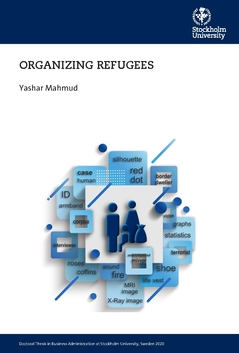On the basis of ethnographic fieldwork conducted in Sweden, Finland, Greece, and Bulgaria during 2015-2019, this study investigates how agency is inscribed into humans and non-humans across space and time. Knowledge drawn from various disciplines engaging with refugees are used to explain the empirical material.
Conventional organizational research takes for granted certain approaches of engaging with, seeing, and writing about the “world,” which results in the world being kept constant. By utilizing actor-network theory (ANT), particularly Mol's (1999; 2002) version, this study alters the notion of reality and tries to understand the world differently, i.e. as a multiple rather than a plural one.
Organizing Refugees shows that a) understanding reality as multiple has profound implications on organizing, and b) refugees are enacted into different but interdependent realities. By giving voice to refugees and revealing their vulnerability, the author calls for humanizing what has been dehumanized, and for new political ways of acting upon the world.
This dissertation is a good read for anyone curious to learn more about organizing, multiplicity, refugees, reality politics, ANT, and time and space.
Yashar Mahmud
An organizational researcher at Stockholm Business School who holds a MSc (2014, Stockholm Business School) and a BSc (2004, Technical University of Varna). His research focus is on organizing, multiplicity, and interdisciplinarity.
This is a Doctoral Thesis in Business Administration at Stockholm University, Sweden 2020

